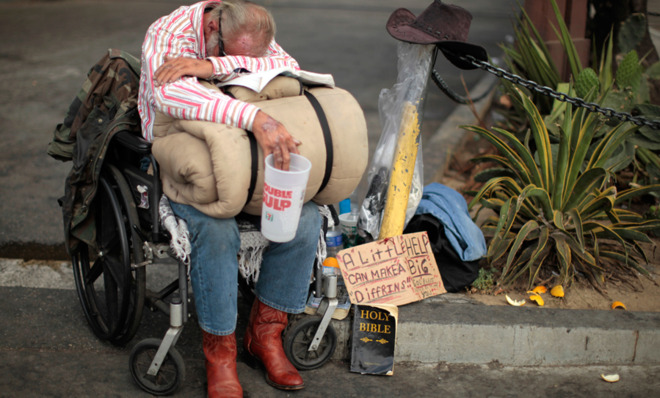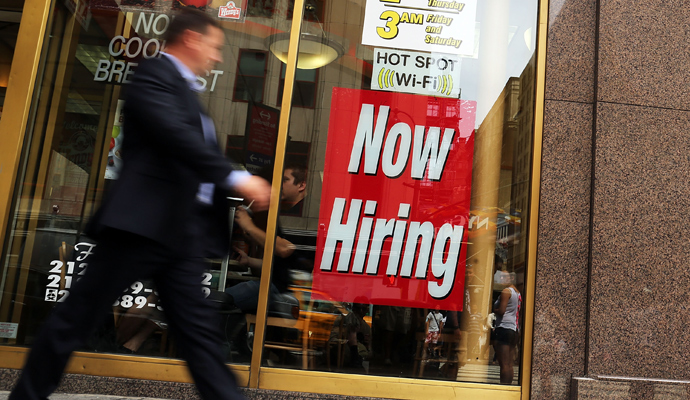Why reform conservatives should embrace a universal basic income
This policy prescription will preserve America's civil society and empower the poor without ballooning bureaucracy


A free daily email with the biggest news stories of the day – and the best features from TheWeek.com
You are now subscribed
Your newsletter sign-up was successful
Reform conservatives — colloquially known as "reformocons" — are having their day in the sun. They made the cover of The New York Times Magazine with their push to move the right away from its myopic focus on tax cuts, starving government, and helping businesses owners. And now Rep. Paul Ryan's (R-Wis.) new poverty plan has effectively taken up their ideas en masse, with an expansion of the Earned Income Tax Credit (EITC) and a welfare reform program emphasizing local and state participation, flexibility, and work requirements.
But if reformocons truly want to remake the American social safety net for the 21st century, they're going to need one additional policy. It's rather radical for the political mainstream, but its radicalism flows from some of the best insights conservatism has to offer. And it falls right in with reformocons' renewed focus on the interests of the poor and working class.
It's called a universal basic income — or a UBI for short. It's simple: The government writes a check for the same amount to every American. It could come once a month or once every two weeks. For Americans under 18, it could be given to their guardians as a child allowance. But most importantly, it comes with absolutely no strings attached. You get it regardless of your income level or whether you have a job. If you're here and you're breathing, you qualify.
The Week
Escape your echo chamber. Get the facts behind the news, plus analysis from multiple perspectives.

Sign up for The Week's Free Newsletters
From our morning news briefing to a weekly Good News Newsletter, get the best of The Week delivered directly to your inbox.
From our morning news briefing to a weekly Good News Newsletter, get the best of The Week delivered directly to your inbox.
This design comes with two immediate strengths that anyone who's read Ryan's plan will recognize. One, it's simple for Americans to use, as opposed to the smorgasbord of assistance programs they face now. And two, because there's no cutoff after a beneficiary reaches a certain level of income, a UBI doesn't create a disincentive for people to keep earning more.
Matt Bruenig and Elizabeth Stoker Bruenig (who both write for The Week) recently calculated that a modest UBI of $3,000 a year would cut poverty in half. The annual $900 billion price tag could be paid for in a revenue-neutral fashion by clearing away the carve-outs in the tax code for the affluent — something reformocons have been hankering to do anyway — and by taking a cue from Rand Paul and reducing military spending.
But most importantly for reformocons, a UBI would plug the final gaping hole in their economic agenda: what to do about worker bargaining power. We're in a slack labor market, meaning there are more people looking for work than there are jobs available. While things are improving, there could always be another recession, and labor markets have actually been slack more often than not since the 1970s. When this happens, workers become more desperate, so they'll take worse jobs for lower pay and poorer treatment because employers hold all the bargaining power.
Not surprisingly, Dean Baker and Jared Bernstein demonstrated in their recent book that when labor markets are slack, wages at the lower end stagnate and inequality increases. Meanwhile, James Pethokoukis and Megan McArdle have pointed out that temp employment is on the rise and work schedules are becoming more haphazard, unpredictable, and capricious for lower-income Americans. This, of course, undermines workers' ability to find a second job, to maintain stable relationships, to see their families, or to participate in their communities. If reformocons are concerned about the rates at which young working-class men in particular quit their jobs, it's worth asking if it's because slack labor markets allow employers to treat employees like disposable chattel.
A free daily email with the biggest news stories of the day – and the best features from TheWeek.com
While Ryan's expansion of the EITC is a good idea, it can't address the bargaining power issue because getting the EITC is dependent on getting a job. So, like much of the rest of America's social safety net, it can't be used as leverage against an employer. Only a non-market wage of some sort can. By providing a little financial breathing room, a UBI would combat labor market slack and let more workers say "no" to jobs that don't come with decent pay and sane schedules.
Unfortunately, this is also what makes reformocons nervous about a UBI, since they rightly recognize the profound human damage that's done — to both individuals and communities — when people detach from the work force. Jim Manzi and Pascal-Emmanuel Gobry have pointed to U.S. experiments with a negative income tax (NTI) — a close policy cousin to the UBI — that showed a drop in work effort of roughly 13 percent. However, the reduction wasn't from people giving up on finding work entirely, but from people simply waiting longer during spells before taking another job — a crucial distinction. Most of them were mothers who chose to spend more time caring for their children, or young people who spent more time accumulating an education. A similar experiment in Canada around the same time found the same result. People weren't "listing away in socially destructive idleness" as Gobry put it; they were simply contributing to the social fabric in ways not recognized by the market.
And even when it's not parents or teenagers waiting longer to get a job, these would-be workers could very well be holding out because they're waiting for a better deal — enforcing exactly the kind of market discipline on employers that results in better wages and treatment. All unemployment is not created equal, and reformocons should not fear the UBI on this score.

In fact, reform conservatives should embrace the UBI's modest reductions of work effort. One of the reformocons' primary concerns is for the "mediating institutions" of civil society; the families, neighborhoods, churches, community groups, charities and so on that make up the fabric of American social life. Perceptive conservatives like Patrick Deneen have long realized that it's not just the state — reformocons' typical bête noire — that threatens civil society, but the market as well. Ross Douthat, another reformocon, recently worried that "both capitalism and the welfare state tend to weaken forms of solidarity that give meaning to life for many people, while offering nothing but money in their place."
When we are dependent solely on the job market for our income, a tyranny of need sets in: We must go where the job market dictates, when it dictates, and do as its vagaries determine. That's why the closing of a factory can decimate a town, and why a layoff can ruin a marriage. The time and energy we pour into work is time and energy we cannot give to our children, our spouses, our community gardens, our church bible studies, our hobbies and talents, or to our bowling leagues. The job market can poison and rend the social fabric as easily as bolster it. But by rolling back the ubiquity of the market, while minimizing the government's bureaucratic footprint (it requires minimal administrative overhead to send people checks), a UBI would thread the needle between the market and the state.
Pethokoukis has also worried that we're headed toward a future where automation really does begin reducing the supply of jobs, or where the economy's ability to deliver more corporate profits while employing fewer people becomes permanent. In that case, a UBI would also shift us away from the current situation, where total dependency on the job market means the most vulnerable Americans are the last to enjoy the benefits of increased productivity, but the first ones to be squeezed out of the labor force when another threshold of efficiency is reached. If the economy is learning to do more with less, then the ideal would be a world where attachment to the labor force remains high, but everyone just works fewer hours — essentially the opposite of what we have now. By equitably distributing some of those productivity gains, a UBI would make such a world a bit more likely.
By giving all Americans at least a little income that is not dependent on the whims of the market, a UBI would allow workers more pro-active control over when and why they do or do not engage with the job market. It would open up more time and space for people to participate in those mediating institutions, becoming a de facto investment in the health of America's civil society. In fact, the investment could very well be literal; any UBI — but especially one financed by tax deduction closures and military spending cuts — would be a massive distribution of income down the income ladder, and most social data suggests the poor and working class contribute more of their income to their churches, communities, and local charities than do the rich.
A UBI could really reinvigorate the kind of social values reformocons champion. Lower-class Americans tend to be bigger fans of traditional moral norms and religious belief, even if they're less able to act on those values than the upper class. Putting more purchasing power in their hands could very well mean more tickets bought for the likes of the Christian film Fireproof, and relatively fewer subscriptions to HBO.
Though he was loathe to recommend any actual policy fixes, even Charles Murray acknowledged in Coming Apart that income inequality is what makes it materially possible for the elite to silo themselves off into their own neighborhoods and cultural bubbles — with all the toxic implications for moral groupthink that siloing entails. It stands to reason that, by reducing inequality, a UBI would do at least something to shove the elite back into greater socio-economic exchange with the working class. Which would probably, in turn, have a salutary effect on the kind of cultural products the elite churns out.

There are lots of other reasons for reformocons to like a UBI. It could easily sit alongside the other ideas in Paul Ryan's proposed poverty programs, providing a non-market counterpoint to the EITC and the opportunity grant's work requirements. Other reformocon ideas — like tax credits to help people buy health insurance, educational vouchers to fund school choice, and relocation vouchers to help people move to more economically productive areas — could be delivered simply and effectively by adding them as top-offs to the UBI. If reformocons are hankering to change Federal Reserve policy, top-offs to the UBI could even serve as a route for the Fed to inject new money into the economy whenever monetary stimulus is needed. (The laws governing the Fed might not even have to be altered; just have Congress borrow the money to pay for the stimulus top-off, and then have the Fed buy up all the newly created debt.)
But the single biggest affinity between reform conservatism and a UBI isn't a policy reason; it's a moral and philosophic reason. One of the most productive and admirable dictums to come out of conservatism is the idea that people know their own needs best. Ryan has praised the Catholic social doctrine of "subsidiarity" — that problems ought to be handled by the smallest and most local authority capable of addressing them. Recent experiments with giving people no-strings-attached cash in the developing world reveal they used the money to invest in health care, education, food, or business ideas. And in 1996, when the Eastern Band of Cherokee Indians in North Carolina opted to open a casino on the condition that some of the profits be distributed to the tribe — thus creating a de facto UBI — physical and psychological health and life outcomes all improved markedly for the Cherokee children in poverty, as their parents used the money to invest in their well-being and ease family financial stress.
Combine all that with the results from the other experiments, and you've got solid evidence conservatives are right: No authority is smaller or more local than the people actually grappling with poverty, and they do tend to know how to address their own problems. As Ryan rightly pointed out in his plan, poverty is complex and takes many forms. Some people just need a temporary leg-up, some need new skills, some need rent, some need car maintenance, some need long-term care, some need help with addiction, and so on. Which is precisely why a UBI is a good idea: Money is a universal problem solver. You can repair your car with it, enroll yourself in drug treatment with it, pay rent with it, enroll in training courses with it, or anything else you may need to do. And because you need to interact and trade with other people and institutions to turn that money into all those life goods, a UBI works with, rather than against, the health of civil society.
Reformocons are in danger of forgetting this. Consider this revealing statement in Reihan Salam's response at Slate to Ryan's plan. Salam flat out stated that "conservatives take a libertarian view when it comes to people who can support themselves and a paternalistic view to those who can't." That conservative principle is getting revised to "well-off people know their own needs best." This is pretty much aristocracy defined; the belief that anyone who is poor must be morally lesser, and in need of molding by their betters.
It would be easy to dismiss Salam's column as merely a moment when the mask slipped and conservatives simply stated what they've always believed. But the precept that everyone, rich or poor, should be respected and trusted to know their own problems and their own challenges is an honorable one. Conservatives and their country will be better off if they stick to it. Embracing a UBI would be an excellent way to do so. Reformocons — and really, all conservatives — should embrace it.
Jeff Spross was the economics and business correspondent at TheWeek.com. He was previously a reporter at ThinkProgress.
-
 6 exquisite homes with vast acreage
6 exquisite homes with vast acreageFeature Featuring an off-the-grid contemporary home in New Mexico and lakefront farmhouse in Massachusetts
-
 Film reviews: ‘Wuthering Heights,’ ‘Good Luck, Have Fun, Don’t Die,’ and ‘Sirat’
Film reviews: ‘Wuthering Heights,’ ‘Good Luck, Have Fun, Don’t Die,’ and ‘Sirat’Feature An inconvenient love torments a would-be couple, a gonzo time traveler seeks to save humanity from AI, and a father’s desperate search goes deeply sideways
-
 Political cartoons for February 16
Political cartoons for February 16Cartoons Monday’s political cartoons include President's Day, a valentine from the Epstein files, and more
-
 The billionaires’ wealth tax: a catastrophe for California?
The billionaires’ wealth tax: a catastrophe for California?Talking Point Peter Thiel and Larry Page preparing to change state residency
-
 Bari Weiss’ ‘60 Minutes’ scandal is about more than one report
Bari Weiss’ ‘60 Minutes’ scandal is about more than one reportIN THE SPOTLIGHT By blocking an approved segment on a controversial prison holding US deportees in El Salvador, the editor-in-chief of CBS News has become the main story
-
 Has Zohran Mamdani shown the Democrats how to win again?
Has Zohran Mamdani shown the Democrats how to win again?Today’s Big Question New York City mayoral election touted as victory for left-wing populists but moderate centrist wins elsewhere present more complex path for Democratic Party
-
 Millions turn out for anti-Trump ‘No Kings’ rallies
Millions turn out for anti-Trump ‘No Kings’ ralliesSpeed Read An estimated 7 million people participated, 2 million more than at the first ‘No Kings’ protest in June
-
 Ghislaine Maxwell: angling for a Trump pardon
Ghislaine Maxwell: angling for a Trump pardonTalking Point Convicted sex trafficker's testimony could shed new light on president's links to Jeffrey Epstein
-
 The last words and final moments of 40 presidents
The last words and final moments of 40 presidentsThe Explainer Some are eloquent quotes worthy of the holders of the highest office in the nation, and others... aren't
-
 The JFK files: the truth at last?
The JFK files: the truth at last?In The Spotlight More than 64,000 previously classified documents relating the 1963 assassination of John F. Kennedy have been released by the Trump administration
-
 'Seriously, not literally': how should the world take Donald Trump?
'Seriously, not literally': how should the world take Donald Trump?Today's big question White House rhetoric and reality look likely to become increasingly blurred
